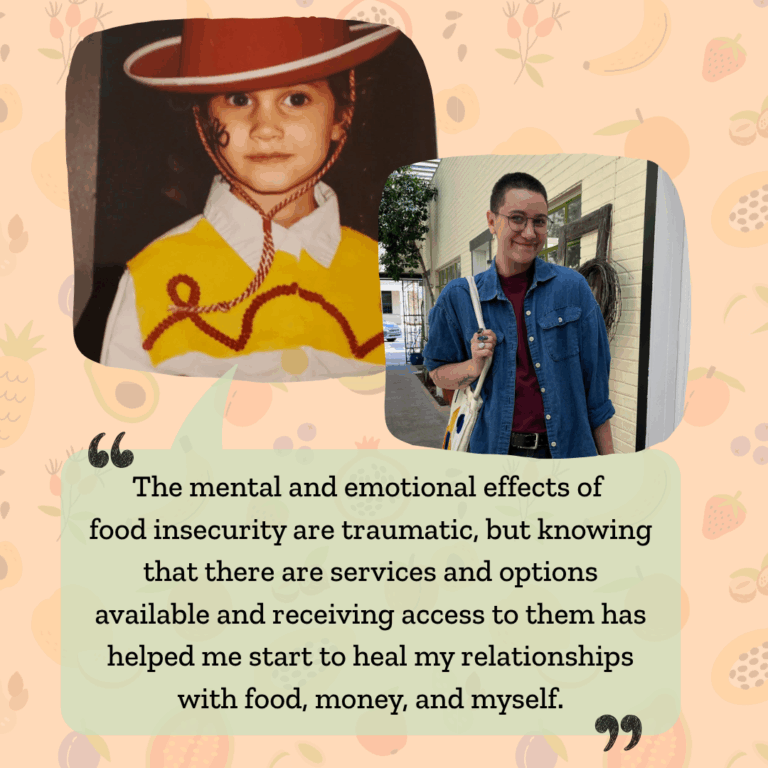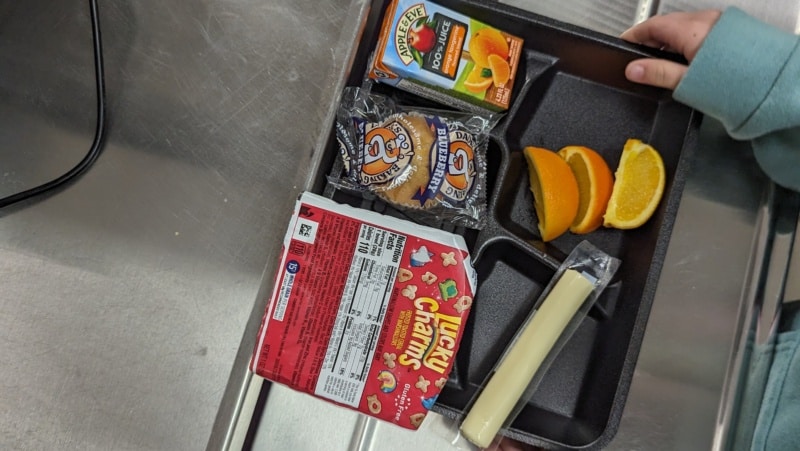“I didn’t have shame about needing help but I feared that I was taking away from someone else who needed it more. I believed then and now that everyone deserves access to food, but I struggled to apply that to myself and understand that I am also deserving of having my needs met.”
Presley Nassise is an artist in Phoenix, Arizona. Presley is a trusted community member, someone who cares deeply about people. He’s lived in Phoenix all his life, and he’s the sort of person who gets to know his neighbors. He says “hello” if you pass him when he’s walking his two service dogs. If you need it, he’ll offer resources, help, or a kind word.
Presley is also the “one” of one of every seven Arizonans that struggle with food insecurity.
He faces common barriers to food access: limited access to transportation, disability, and his queer and transgender identity. People living with a disability are four times more likely to experience food insecurity according to the USDA, and transgender individuals are three times more likely, according to a study by the Williams Insitute at UCLA.
SNAP (Supplemental Nutrition Assistance Program, formerly “food stamps”) gives eligible households access to foods by relieving budgetary restrictions that prevent Americans from filling their fridges and cabinets. Presley didn’t know he was eligible for SNAP, found the process of applying intimidating, and faced typical fears around needing food assistance.
This year, he applied and was approved for SNAP benefits, and now, he only wishes he’d known sooner.
“Once I got past my emotional reservations,” he says, “the application itself was actually pretty straightforward, and I was pleasantly surprised with the ease of the process.”
Presley posted up in a local coffee shop and completed the application in under an hour. Three days later, he received a phone call from the Department of Economic Security to complete an interview process. He told us that this was the most challenging part.
“I was glad I’m self-employed and was able to easily and quickly access the documentation they needed. I read later (on their website) that you can call them yourself when you’re ready to interview, rather than waiting for them to call you.” He recommends the second option, so you can be ready with your required documents.
“Overall, the process was easier and MUCH faster than I expected! At the end of my phone interview they told me immediately that I was approved.”

Presley rides his bike or uses the light rail to access healthcare, and for his commute to work. Due to a chronic illness, many times Presley doesn’t have energy or resources to add grocery shopping to his list of daily trips. With SNAP, he can visit farmer’s markets or grocery stores when he’s able, and order grocery deliveries with his EBT (SNAP) card. This means he has consistent access to healthy food he enjoys.
“Getting access to benefits has helped me embrace that… I deserve not only a full belly but a full cupboard too, and the ability to make choices about what goes in it.”
He emphasizes that last point – that the dignity of choice has affected him in more ways than one. It’s not just about hunger. Access to food is about autonomy, and it permeates all areas of life. With reliable meals, Presley can dedicate his time to his art and his community, instead of worrying about an empty pantry.
“Within just three months, access to SNAP EBT has completely changed both my physical and mental health,” Presley says. “It allows me to make food purchases that are in line with my dietary restrictions, sensory issues, as well as purchases that make my brain and body happy – whatever that may look like day to day. Some days my body needs fresh produce from the market, and sometimes it needs my favorite snack from the bodega, and the benefits help me make that choice without shame or anxiety.”
Now, Presley is sharing his experience with his friends. He recommends others check their eligibility, and to work with a trusted friend, therapist, or social worker if you have anxiety around the process.
“A large part of my experience with applying for and getting access to SNAP has been an emotional journey processing [the] trauma of food insecurity,” he shared. “I had reservations about whether or not I was struggling ‘badly enough’, and I hear those same fears reflected in my community. It wasn’t until after I applied that I realized how many of my close friends and community members not only qualified but would significantly benefit from access to SNAP EBT, and that they–like me–didn’t know there were services that could help them.”
He’s now encouraging friends to reach out to him if they have questions so he can help.
“I believe that it is our job as community members to come together to meet the needs of those around us, and when it comes to food, I believe that we are responsible not just for feeding people, but also for allowing them the dignity of choice and access to food that meets a wide variety of cultural, dietary and sensory needs.”
The US Senate is considering a 30% cut to SNAP funding. Read about the three ways that would affect Arizonans and why AzFBN’s member food banks stand united against the budget “megabill”.
